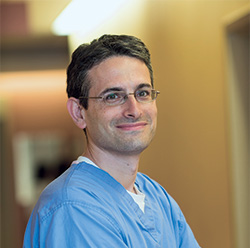Multiple Gestation Monitoring & Specialized Care
Between 1980 and 2009, the number of twin pregnancies in the United States rose by 76 percent. Pregnancies with multiple fetuses require heightened prenatal monitoring and specialized clinical management. Maternal-Fetal Medicine subspecialists have expertise in providing this specialized care, from managing identical twin gestations complicated by malformations, to evaluation and treatment of discordant growth and twin-twin transfusion syndrome.
Women carrying multiples are at significantly increased risk for preterm labor and delivery.
Given the increased risk of congenital anomalies in twin gestations, our Maternal-Fetal Medicine specialists recommend a detailed sonographic survey of fetal anatomy in the early second trimester of twin gestations. In monochorionic twin gestations and dichorionic twin pregnancies conceived using assisted reproductive technologies, our specialists suggest fetal echocardiography because the risk of congenital heart disease is increased in these populations.
In Utero Diagnostic Procedures

Our Maternal-Fetal Medicine specialists have pioneered in utero fetal procedures to diagnose and treat some of these serious complications using chorionic villus sampling, radiofrequency ablation, fetal blood sampling and transfusion, and drainage and shunt procedures.
Non-Selective Reduction & Selective Termination
To improve pregnancy outcome, we offer non-selective multifetal reduction when assisted reproduction techniques result in multifetal pregnancy, and selective termination when the well-being of a healthy fetus is threatened by an anomalous fetus.
Abnormalities We Can Diagnose & Treat
NewYork-Presbyterian Morgan Stanley Children’s Hospital is currently the only center in Manhattan that performs the laser photocoagulation procedure for Twin- Twin Transfusion Syndrome (TTTS).

Dr. Russell Miller, Medical Director, Carmen and John Thain Center for Prenatal Pediatrics
We have particular expertise in diagnosing and treating a range of problems affecting pregnancies with multiples including:
-
Preterm labor
-
Intrauterine growth restriction
-
Birth defects and genetic syndromes
-
Monoamniotic twins
-
Twin-Twin Transfusion Syndrome (TTTS)
-
High-order multiples
-
Twin Reversed Arterial Perfusion (TRAP) – also known as acardiac twin
Twin-Twin Transfusion Syndrome/Laser Photocoagulation
As the number of women having twins has increased, so have the chances of developing a serious pregnancy complication called Twin-Twin Transfusion Syndrome (TTTS). This disorder affects as many as 15 percent of identical twin pregnancies and results from uneven blood flow between the fetuses. Successful treatment of this complex condition requires advanced training and experience available at only a few specialized perinatal centers in the United States. In more than 70 percent of cases, both twins will die if this syndrome is not treated early in pregnancy.
Over last three years, our Maternal-Fetal Medicine specialists performed more than 76 laser photocoagulation procedures, a minimally invasive laser treatment which involves coagulating unnecessary and harmful blood connections between the two fetuses. Typically, our doctors perform this procedure between 16 and 26 weeks of gestation to help improve survival and neurological outcomes for identical twins with this syndrome.
Recent hospital data show that in 80-90 percent of cases using the photocoagulation procedure, one twin will survive. Both twins will survive in over 50 percent of cases, and fewer than 10-20 percent of surviving twins will have brain damage. The traditional approach of amnioreduction had a lower survival rate and more neurologically impaired survivors. NewYork-Presbyterian Morgan Stanley Children’s Hospital is currently the only center in Manhattan that performs the laser photocoagulation procedure.



